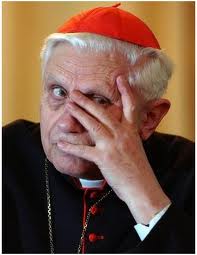Q: What caused the Big Bang?
A: God did it!
Q: How can a spontaneous “Big Bang”
give us a highly fine-tuned and intelligible universe?
A: God did it!
Q: How can ordered, but dead matter &
energy become alive?
A: God did it!
Q: How can something alive become
self-aware?
A: God did it!
As science closes gaps between what we
know and what we don’t know about the material world, will the god that lives
in those gaps eventually be squeeze out of the minds of people? I should think
that for every gap science closes several more gaps open up, but whatever the
gaps are, is the more rational and intelligent answer to say “nothing did it”?
Any thinking Christian will, of
course, acknowledge the many secondary causes that exist in all of reality, but
God as the first cause of all things
material and immaterial is a non-negotiable dogma. Likewise, a strict
materialist or strong atheist will recognize secondary causes, but do they not
essentially defer to “nothing” as the ultimate answer to certain gaps? So we
end up with "the nothing of the gaps".
 |
| Nothing to see here... Move along... |
The
Gap from Meaning:
Q: If we come from
nothing for the purpose of nothing and are going back to nothing, what is the
meaning behind it all?
A: Nothing.
One might strongly object
and answer, “We make our own meaning!” Making our own meaning in life may be
compared to multiplying a number by zero. No matter how huge the number, multiplying
by zero always makes it zero. No matter what you achieve in life, when you
decay to nothingness it becomes “zero”. No matter how many future generations
you help, each one is “multiplied by zero” as the universe marches on indifferently.
Meaning is received, not made. Professor Joseph Ratzinger (future B16) gives a clever analogy to self-made meaning in his book Introduction to Christianity (2004 edition, pp 73). Imagine a man trying to pull himself out of a bog by his own hair. This is the absurdity of the statement, “We make our own meaning.”
 |
| Little help!?! |
The Gap from Goodness:
Q: What is the ultimate
source for the good, the beautiful and the true?
A: Nothing.
One might object and
answer, “These are merely human opinions & concepts that evolve over time, so the ultimate
source is human.” And what is the
ultimate source of humans? The answer would still come back to nothing if we truly
come from nothing intelligent and with no intended purpose.
The
Gap from Intelligence:
Q: Since the universe is highly
intelligible, where did its intelligibility come from?A: Nothing.
Many atheists can gladly agree that
the known universe began some 13.7 billion years ago and that every effect must
have a cause, so if there was a big-bang there must also be a “big-banger”.
They may even go so far as to agree that the big banger (whatever caused the
big bang) must be something outside the known universe, but no matter how much
consensus there is, it seems to stop at the gap of “intelligence”.
No matter how incredibly fine-tuned things are, like the
universe, our planet, our minds & our bodies, their origins must be “dumb”. No matter how much
evidence of design there is it can only
be by chance. The thinking of the past was that a highly ordered and
intelligible universe must clearly have an intelligent creator. Today’s
“progressive” thinking is that a highly ordered and intelligible universe must
clearly come from mindlessness…clearly. One might call this having an irrational "faith" in chance.
If we insist on “nothing” to fill the
gaps for the most important question in life, then the effect of original sin
that dims the intellect is easy to see.
“Those who run after nothing become
nothing”
– Pope Francis
 |
| In the last analysis it's either all or nothing. |






























